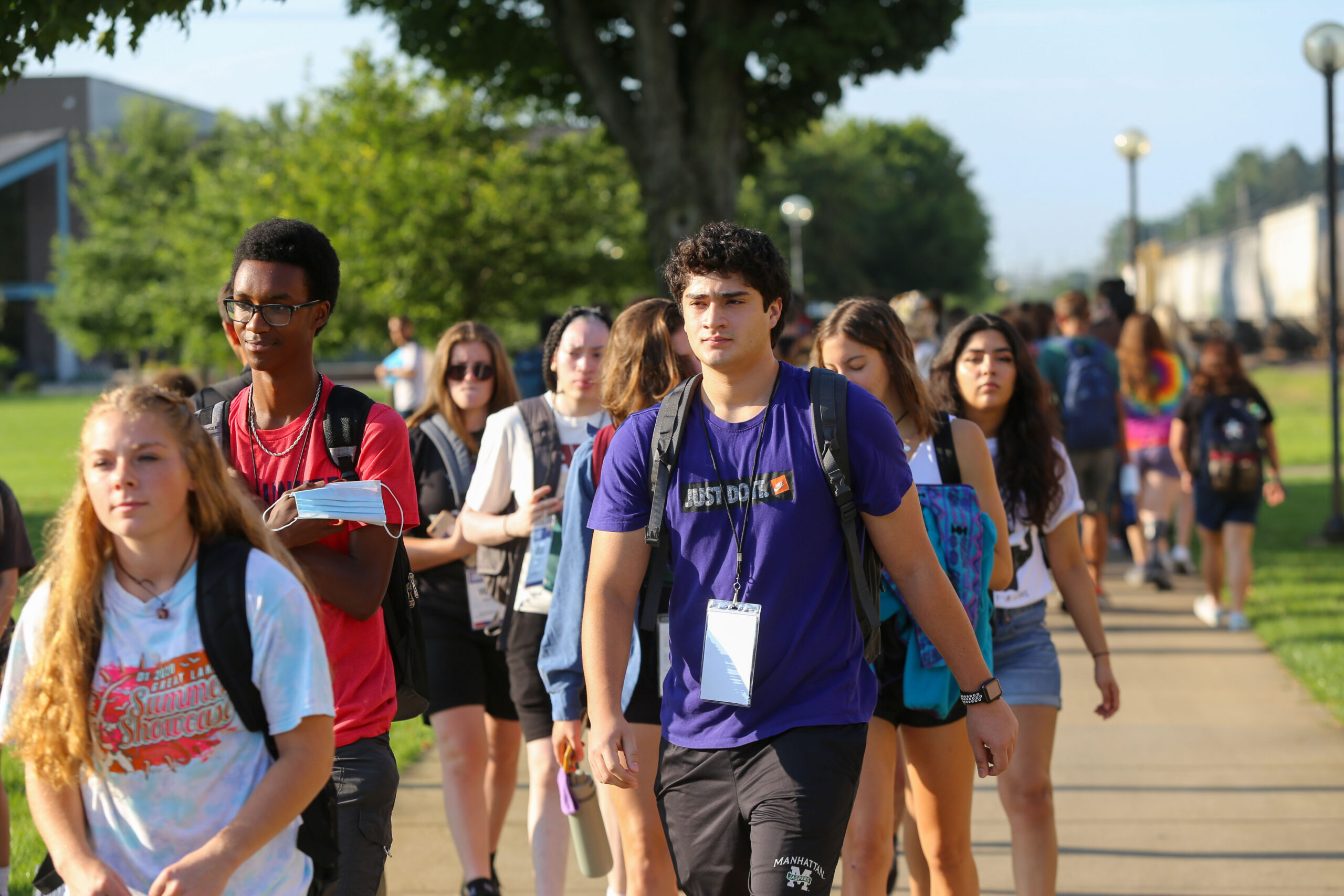Ben Cerceo used to be an extrovert. But after finishing his senior year of high school online, he arrived at Goshen College worried he had lost his “social battery.”
"Having this forced interaction was really important to remind them how to be more social again."
— Andrew Hartzler
“I didn’t really talk to anyone my senior year,” the first-year from Seattle, Washington said. Due to the pandemic, his classes were all virtual and most of his communication happened online. Cerceo, who has been a declared elementary and special education major since second grade, admitted: “I felt really unprepared for college.”
For students like Cerceo, the pandemic amplified the already challenging transition to college life. “This is a class that spent the last part of their senior year with restrictions to celebrate milestones (senior trips, prom, graduation),” said Adela Hufford, director of orientation, transition and retention.
These circumstances begged the question, “How do we think about and plan for an incoming class Fall 2021 that spent their entire senior year within a pandemic? How do we prepare new high school graduates to be successful college students?”
The answer she and others in the Presidential Cabinet came up with was to create an extended new student orientation meant to kickstart their college experience.
First-year students checked in on August 22, a full week before the rest of campus arrived. They spent the week getting to know others in orientation groups, exploring the area and attending sessions with professors, Student Life representatives and returning students.
The first-years also started meeting with their ICC (Identity, Culture and Community) classes a week early, which “gave all first-year students a chance to practice doing a college course before they jumped into their full schedules,” explained Suzanne Ehst, the director of core curriculum. It also allowed them to get comfortable with Moodle, GC’s course management system and gave them a place to ask their “new student questions.”
Andrew Hartzler, an accounting professor, is one of the instructors for Cerceo’s ICC class. He taught his first ICC class last year, and said he noticed immediately that his students hadn’t received the preparation they needed to succeed in the college environment.
From operating Moodle, to managing time, to navigating campus, first-year students have a lot to get used to and “one weekend is clearly not enough,” Hartzler said.
But possibly the largest benefit of a longer orientation period is socialization.
“Generationally, people who are coming into college now are more willing to just sit in their room and not talk to people,” Hartzler said.
Of course, the pandemic didn’t help. “Because people were more isolated,” Hartzler continued, “having this forced interaction was really important to remind them how to interact with other people, how to be more social again.”
The tentative number for the first-year cohort sits at 183 students, slightly below the average of 186 over the past three years.
“The recruiting season this past year was a challenge due to COVID restrictions,” said Linda VandenBosch, director of transfer, adult & graduate admissions. “The admissions team worked very hard to adapt to a year with no travel and no large bus groups from high schools.”
While diversity among students in many realms stayed the same or increased this year, VandenBosch noted a drop of 6 percent in incoming Hispanic students.
“While for some students this may not have been pandemic related,” VandenBosch said, “there have been national reports over the past year that suggest that the pandemic has had more significant effects on college enrollment among Hispanic students.” One study by the National Student Clearinghouse Research Center put the estimated drop at 5.4 percent for last fall.
The new orientation model may not have affected who chose to come to GC this year, but it did affect how those who came are adapting to college life. Hartzler noticed a positive impact among one group in particular—commuter students.
The intensive schedule during orientation week gave students who live at home a chance to experience what it is like to spend an entire day on campus.
“College is an experience,” Hartzler said. “It shouldn’t be just go to class and then go home—in order for it to be an experience, you have to get to know other people.”
Hartzler said the commuter students in his ICC class this year are more outgoing. “They feel more connected even if it’s still hard to break into the residential students.”
While both Hartzler and Hufford said there were hiccups that should be worked out, they agree that the new orientation model was a success and hope to continue to use it in the future.
For Cerceo, orientation was a chance to ask questions and meet people he might not have otherwise. “After freshman orientation I was so exhausted I stayed in my room for 6 hours,” he said, “but I have definitely been talking to more people.”



